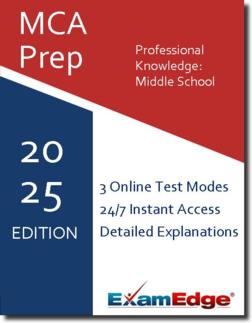MCA Professional Knowledge: Middle School (062) Practice Tests & Test Prep by Exam Edge - Topics
Based on 37 Reviews
- Real Exam Simulation: Timed questions and matching content build comfort for your MCA Professional Knowledge: Middle School test day.
- Instant, 24/7 Access: Web-based MCA Professional Knowledge Middle School practice exams with no software needed.
- Clear Explanations: Step-by-step answers and explanations for your MCA exam to strengthen understanding.
- Boosted Confidence: Reduces anxiety and improves test-taking skills to ace your MCA Professional Knowledge Middle School (062).

Understanding the exact breakdown of the MCA Professional Knowledge Middle School test will help you know what to expect and how to most effectively prepare. The MCA Professional Knowledge Middle School has multiple-choice questions The exam will be broken down into the sections below:
| MCA Professional Knowledge Middle School Exam Blueprint | ||
|---|---|---|
| Domain Name | % | Number of Questions |
| Student Development and Learning | 30% | 30 |
| Assessment, Instruction, and the Learning Environment | 50% | 50 |
| The Professional Environment | 20% | 20 |


